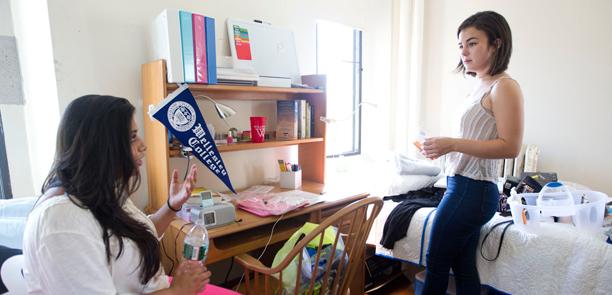***Editor’s Note: This article was published as part of the satirical April 1, 2015
Many members of the Class of 2017 became confused this past week when they received emails from the Housing Office announcing a lack of singles. Most were sure that their numbers were good enough such that they could be guaranteed singles, as in my case. My number was below average last year, so when I found out that my number was 105th in my entire class’s lottery number range, I was overjoyed. Being in the top 20 percent, I could not imagine any situation where I, or my blocking partner, would ever be denied a single. Turns out I didn’t have to imagine it, because it happened.
The new, improved lottery system has been put to blame, though hesitantly, since thus far the paperless system has been positively received as “totally not confusing” (A. Lyer) and “so well thought-out that not one person has attempted to contact the Housing Office” (Sum Kidd) by the student population. However, after a great deal of thought, I have realized in my official capacity as a sophomore who has absolutely no training in political science or economics, that this year’s housing process is the biggest accomplishment in political science and economics that Wellesley has ever come up with in the history of the College.
I used to be like some students of the sophomore class who were mildly frustrated by their unexpected loss of a single, such as Ann Gree ’17, who calmly commented, “What the living [redacted]. I had to live on Freeman this year because last year because wherever the [redacted] else are you going to live when your number is [redacted] 1888?! I suffered having to live in, I can’t even say it, East Side while all of my friends lived in Tower and when I had my one chance to be in the first half of the lottery numbers I find out that I can’t even live in a single… even at Bates! Which was my 15th choice after [redacted] Orchard [redacted] Apartments – wherever the [redacted] that is.” Though I understand this anger — I, too, was once Gree — I have since realized that our frustration is born out of ignorance.
Here at Wellesley College, students spend a great deal of time, energy, and money to receive the best education possible — one that will prepare them to succeed in the real world. The housing office’s policy changes were clearly made in an effort to better imitate the world we as students will enter, thereby helping us achieve success.
What can better represent the real world than a housing system that only guarantees singles to those holding the top lottery numbers in the junior class? Sure, this kind of system had already been in place, but the office has enhanced the realism of the situation by taking the low number-high number disparity to such extreme levels that, only the top 15 percent of lottery numbers are guaranteed singles. That’s right, a student’s chances of getting a single all depend on having one of a small percentage of lottery numbers, a factor that students have very little say in, can do very little to improve on, no matter who they are personally, how hard they work, or how much they believe in the Wellesley Dream to become some glorious combination of Hillary Clinton and Beyonce. Those top 15 percent get to hold power over 10 percent of singles available to juniors. Obviously, this policy will allow us as a class to better understand and gain some first-hand experience with life outside “the bubble.”
They have already chosen to be generous by rejecting the move to guarantee housing to only the top 66 percent of all students with the highest income, and now they have changed the lottery to better reflect the real world in other ways.
The other 85 percent of the incoming junior class who were not guaranteed singles, including myself, will get to experience the kind of decision-making that many do in the real world, between sticking by your blocking family in an unexpectedly unfavorable living situation, or abandoning them to have some chance at attaining our original housing goals.
Finally, through the new blocking rules, we will get to practice the valuable skills that this kind of system inevitably forces people to hone, such as desperately networking with the 15 percent in an attempt to have a better chance at living in a single. Some may learn the importance of taking advantage of loopholes by blocking with rising seniors.
In the future, we may even see some capitalist phenomena such as the 85 percent paying property-holders under the table to get the living spaces they want; it’s a perfect way to practice trying to find housing in places like New York. Obviously, the educational potential in this new system is limitless, and I hope you think so too, although you don’t really have a choice.
Rumors are that The Housing Office’s next step of scaling back the housing guarantee will consider more students’ housing circumstances and work to improve them. Some say it is to be called the “Understanding Homelessness Initiative.”
Photo Courtesy of Wellesley College




